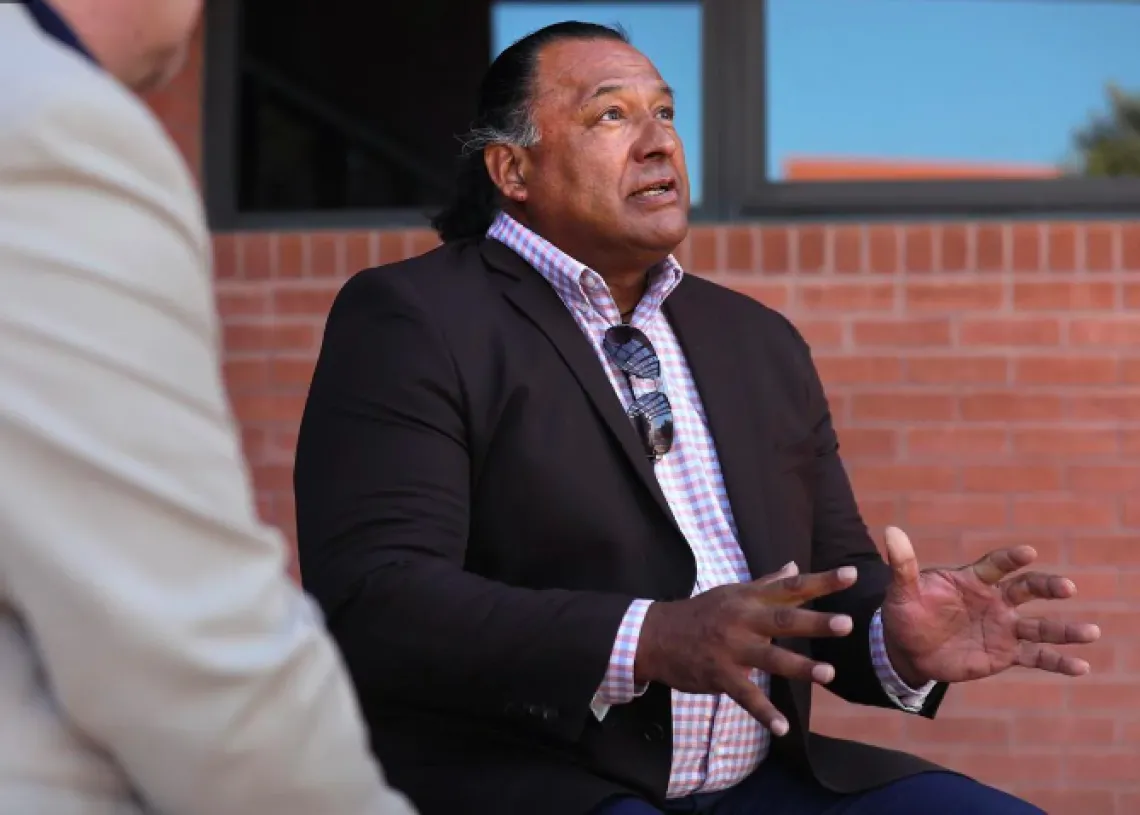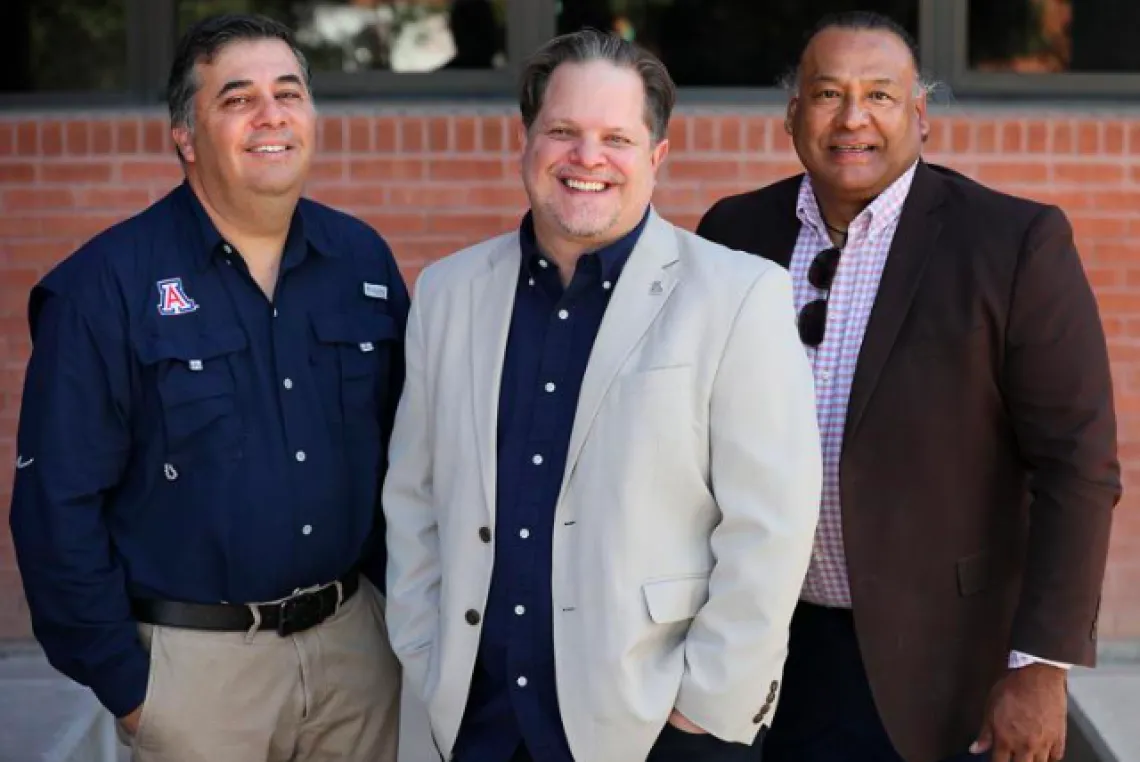UA launches program to help tribal entrepreneurs succeed

This article was originally published on Tucson.com
Arizona’s Native American tribes are getting help fostering entrepreneurship among their members from the University of Arizona’s business accelerator.
Last week, Arizona FORGE (Finding Opportunities and Resources to Grow Entrepreneurs) picked the San Carlos Apache Tribe as the first participant in Native FORGE, a five-year effort to help advance Native American business startups across the state.
The program, backed with an annual $100,000 grant from the U.S. Economic Development Administration and matching funds from the UA, will provide education, mentoring, coaching, exposure to the venturing process, readiness assessment tools and services and access to resources to scale up and launch a business.
The San Carlos Apache Tribe nominated five entrepreneurs to participate in the program: Alice Juan of the Bylas District Economic Enterprise; Rachelyn Kenton of Seven Mile Wash Economic Enterprise; Davida Olivar of Hometown Events; Tristan Sneezy of Apache Fuel & Public Management; and Davison “Beejay” Ward Jr. of Sewn by Beejay.
The San Carlos Apache entrepreneurs will travel to Tucson for the first Native FORGE Conference, held at FORGE at Roy Place from Nov. 2-3, coinciding with the TENWEST Impact Festival.
Supporting tribes
The Native FORGE participants will be advised by UA alumnus Rafael Tapia Jr., a Pascua Yaqui tribal member who was named mentor-in-residence dedicated to the program.
Tapia has been vice president of programs for more than seven years at the nonprofit service group Partnership With Native Americans, which provides support for hundreds of tribes in nine states including Arizona.
Tapia, who earned an MBA from the UA in 2010, said programs like Native FORGE are needed to boost tribal economic systems that were disrupted by the arrival of Europeans.
“Tribes, nations on this continent historically had extensive trade routes, economic systems that supported the community,” Tapia said. “Then, the impact of colonization really disrupted not only the way of life, the culture, but also the systems that sustained them."
Native FORGE represents a way to work with tribes that are focused on economic development and entrepreneurship, he said.
“This is helping to connect and support the work that’s going on in tribal communities to build economies that are going to help the nation thrive, and the UA and Native FORGE are a tremendous resource the communities can benefit from,” Tapia said. “Bringing them together is a tremendous step for both the university and the communities we’ll be serving.”
Startup training
At Native FORGE, the entrepreneurs will get intense, hands-on training from Tapia as well as from FORGE’s stable of seven other mentors-in-residence with widely varied experience, said Arizona FORGE Founding Director Brian Ellerman.
They will work through a FORGE curriculum that combines business planning, financial literacy, intellectual property and other startup concepts, he said.
“Part of the goal in this is to get a sense of what they need,” he said.
he upcoming Native Forge Conference will provide the entrepreneurs with access to venture resources, introductions to mentors and investors, and technical equipment including laptops and Wi-Fi hotspots.
Nathan Nash, economic development manager for the San Carlos Apache Tribe, said the tribe has been trying to increase interest in entrepreneurship to give members more options — and keep more money on the reservation.
He said an estimated 60% to 70% of money generated by tribal members leaves the reservation.
“We can’t sustain the economy with that,” Nash said.

The San Carlos Reservation, one of three Apache reservations in Arizona, is home to about 10,000 residents and spans 1.8 million acres or nearly 3,000 square miles across parts of Gila, Graham and Pinal counties.
The tribe’s economy relies on tourism — including the Apache Gold Casino & Resort near the community of San Carlos and Apache Sky Casino near Dudleyville in Pinal County — as well as forestry and ranching.
Nash said the tribe has tried to boost entrepreneurship with community outreach including in recent years a “Shark Tank” style business-pitch competition with a $5,000 prize, and it has partnered with Eastern Arizona College to host a small-business lecture series for tribal members.
Broader outreach
The San Carlos tribe was picked among several tribes that applied for the Native FORGE program, including locally the Tohono O’odham Nation, and the plan is to take a cohort of five entrepreneurs from one tribe through the program each year, Ellerman said.
But FORGE also is reaching out to all 22 of Arizona’s federally recognized tribes to help as needed, Ellerman said, noting that FORGE already has been providing entrepreneurial resources to the local Pascua Yaqui Tribe, he said.
“With them so close by, we’ll work with them as we do all of the community, we’ll engage them in a different way,” Ellerman said. “We consider that table stakes.”
He said he was pleased that all of the tribes that applied for the program but were not selected have reached out to see how they can collaborate going forward.
Ellerman said FORGE’s application for the Economic Development Administration grant stemmed from discussions he had with Levi Esquerra, who was named the UA’s first senior vice president for Native American Advancement and Tribal Engagement in 2020, reporting directly to UA President Robert Robbins.
Esquerra, who previously served as director of the Center for American Indian Economic Development and the Rural Policy Institute at Northern Arizona University, said the Native FORGE program was a way to leverage the UA’s significant resources to help the tribes.
“We want to help build tribal economies” said Esquerra, who served as chairman and council member for the Chemehuevi Indian Tribe in California. “Most of the jobs in the reservations are government jobs, federal, tribal government or tribal enterprises, but if you want to build an economy you have to have small businesses.”
The way to fight “leakage” of money from reservations is to create businesses at home, he said, citing the San Carlos Apache Tribe as an example.
When one tribal community realized they were spending up to $50,000 a year on T-shirts, the tribe helped set up a local T-shirt printing shop to serve several communities, employing two workers and assuring that money spent on shirts stayed local, Esquerra said.
“I wish more tribes would do things like that,” he said.

